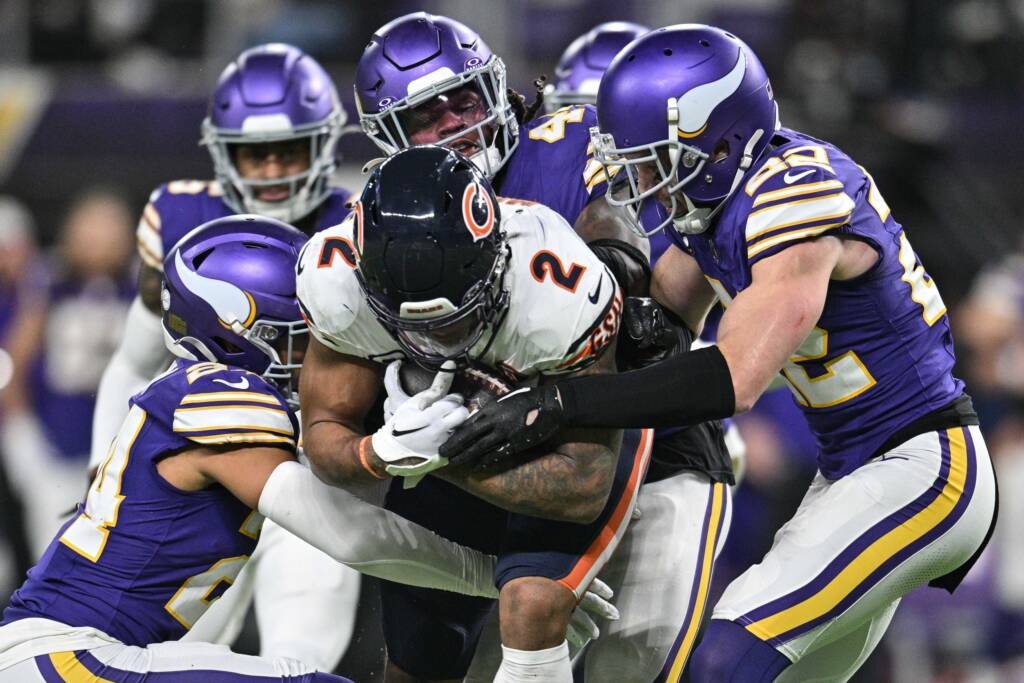When the Minnesota Vikings hired Mike Zimmer in 2014, he took over a squad struggling on defense and transformed it into one of the better units in the NFL. Three years later, he led the team to an NFC Championship game appearance for the first time in close to a decade.
Then the Vikings signed Kirk Cousins as the final piece to get them over the hump. After that, everything seemed to fall apart. Minnesota went to the playoffs once in the next three seasons and didn’t sniff a division title.
We can’t blame this all on Cousins. There’s a slew of reasons for the Vikings’ decline — from the offensive line coach dying the night before training camp began to the entire defense getting hurt and the continuous rotation of offensive coordinators. But it’s fair to ask where this team is headed.
For the upcoming season, the answer is clear. They are all in. This offseason, the Vikings managed to sign a lot of free agents despite their cap crunch. They learned from the mistakes they made a season ago and brought in seasoned veterans at every level.
A year ago, Cameron Dantzler was a starter; he is now the fourth outside cornerback on the depth chart. Shamar Stephen was a starter a year ago, and he just got cut by a different team. Now the Vikings have one of the best interior defensive lines in football, paired with a solid linebacking crew and a potentially good secondary.
Offensively, they let go of left tackle Riley Reiff but drafted a replacement with their first pick in the draft. They upgraded the interior not only through homegrown development in Oli Udoh but by taking Wyatt Davis. When Irv Smith Jr. was declared out for the season earlier this week, they didn’t waste time, trading a fourth-round pick in a package for former New York Jets tight end Chris Herndon.
While this team still might not be enough to contend for a Super Bowl this year, they are all-in, and that approach cannot be ignored. Nevertheless, the future beyond this season is hazy, and nothing they are doing indicates a clear approach. They seem to be a team trying to squeak out one final winning season while their window of contention is rapidly closing.
Most of the defensive starters that the Vikings landed in free agency are on one-year deals (see Sheldon Richardson, Nick Vigil, Patrick Peterson, Mackensie Alexander, Stephen Weatherly, Bashaud Breeland, and Xavier Woods). Second, to create cap room this year, the Vikings struck a deal with Anthony Barr that makes him a free agent in 2022. So essentially, half of the Vikings’ defensive starters will be off the team after this season. The remnants? Eric Kendricks, who is turning 30, and Harrison Smith, 32, and inked for the rest of his career.
The Vikings’ cornerbacks projected to be on the roster past 2021 are Cameron Dantzler, Kris Boyd, and Harrison Hand. Beyond Smith and Danielle Hunter, they barely have any rosterable safeties or defensive ends. Beyond this season, the only sound part of the defense is the interior defensive line, with Armon Watts, Dalvin Tomlinson, and Michael Pierce.
Offensively, Justin Jefferson and Dalvin Cook remain some of the best players at their positions, Irv Smith Jr. is a walking mismatch when he’s healthy, and the offensive line is young and potentially set for the future. However, Adam Thielen is 31, and they still don’t have any legitimate receiving options beyond him and Jefferson.
Then there’s the quarterback dilemma. The Vikings tried to trade up in this year’s draft to land Justin Fields. Even if the move didn’t pan out, it suggests that they want to move on from Cousins — maybe sooner rather than later. As it stands, his 2022 cap hit is a whopping $45 million because the Vikings kicked his money down the road to make space. However, it might finally be time to pay up unless they extend him or add void years to his contract.
Finally, we have to ask if Spielman and Zimmer are officially on the hot seat. If they are, then it’s probably best to leave Cousins’ contract as it is. If this season doesn’t end up the way the Vikings’ brass envisions, there might be a regime change. If they aren’t under pressure from ownership, they may extend him and keep shuffling money into the future.
But that should be every Vikings fan’s biggest fear because this is just a cycle of going nowhere. While Cousins is a good quarterback, in his three seasons in Minnesota, he has shown that he isn’t the type of player who will elevate those around him or make up for his teammates’ shortcomings. Minnesota doesn’t have many resources to field a defense much better than the one they’ll have this year with Cousins’ money on the books.
They also had the advantage of bargain-bin snooping this offseason due to many veterans betting on themselves with cheaper one-year prove-it deals in a year where the coronavirus deflated the salary cap.
All in all, this Vikings roster needs a lot of work even though it is star-studded. Their “win-now” approach every year has failed due to poor drafting and development. It may sting to hear, but a slower rebuild might be the best-case scenario.
Minnesota doesn’t have to burn everything down as the Miami Dolphins did. They have a nucleus with their offensive line of the future, superstars at the top receiver and running back spots, and a pretty good tight end. The toughest part is finding a franchise quarterback. Defensively, it’s a bit more challenging with more holes to fill, but if they can get back to the fundamentals of good drafting and developing — with this regime or another one — the Vikings could be back in no time, regardless of what happens this year.

